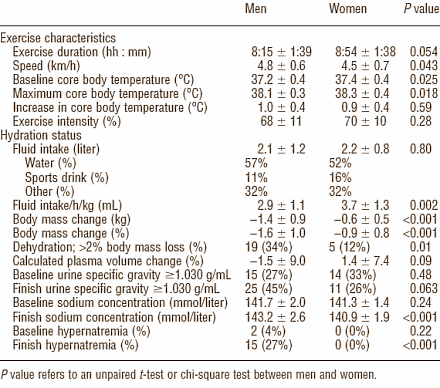|
Definition: "An ergogenic aid is any substance or phenomenon that enhances performance "
|
|
||||||||
18.04.2013 |
|
|
Men more likely to dehydrate than women during exercise
When covering long distances men dehydrate faster than women. Dutch physiologists at the Radboud University Nijmegen discovered that men drink less and probably lose more fluids through transpiration than women. Men are four times as likely to suffer from dehydration than women.
Study
Results
The amount of plasma in the men's blood decreased, in the women it increased.
Part of the explanation is that the men drank less during the walking than the women. Both men and women drank on average just over 2 litres, but the table shows that if you compare the amount of fluid drunk with bodyweight, then men drank significantly less than women.
At the end of the four-day march 34 percent of the men had dehydration symptoms: their bodyweight had decreased by more than 2 percent. Among the women only 12 percent lost so much weight.
In addition, 27 percent of the men had hypernatremia by the time they reached the finish line. Hypernatremia is an indication of dehydration.
So men are four times more likely to suffer from dehydration as women. This is partly because men drink less, but also partly because men lose more fluids through sweating. The researchers estimate that women lose about 2.9 ml water per kg bodyweight per hour, and men 3.7 ml.
Conclusion
Source:
More:
|
|


